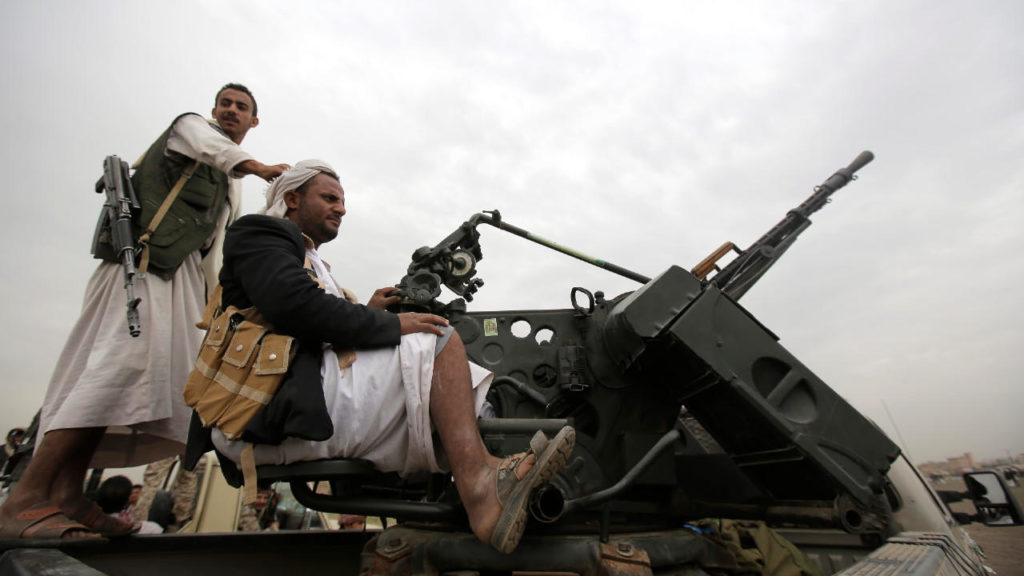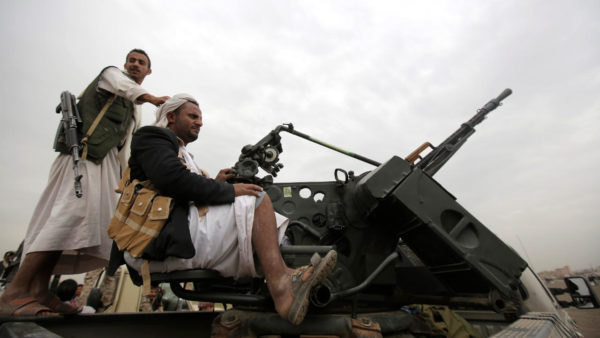
After seven years of brutal civil war in Yemen, the Iran-backed Houthi armed group refuses to give up arms and negotiate – despite their Saudi antagonists’ ceasefire offer on Monday and the US withdrawing its support for Riyadh’s role in the conflict last month.
The Saudi-led coalition fighting the Houthis cleared four fuel ships to dock at Yemen’s Hodeidah port on Wednesday. This followed the Iran-backed group’s statement that it would only agree to the ceasefire proposed by Saudi Arabia on March 22 if it stops its blockade – which makes it much harder to deliver humanitarian aid to a country at severe risk of famine, according to the UN.
But so far, the Houthis have refused to put down their weapons and enter into talks. Experts say the Saudi olive branch comes from a potential roadmap to peace first discussed over a year ago. It was set up under the UN’s aegis, but now envisages a more prominent role for the US since Joe Biden replaced Donald Trump as president in January.
This plan includes a UN-supervised ceasefire, measures to reopen Sana’a airport in the Yemeni capital and the lifting of trade restrictions on the government-controlled Hodeidah port – followed by talks between the Houthis and Yemen’s Saudi-backed coalition government.
‘Calling their bluff’
For the Houthis, “the devil is in the details”, Peter Salisbury, a Yemen specialist at the Brussels-based International Crisis Group, wrote on Twitter. “The Saudis, the government and the Huthis [an alternative spelling] all say they support the initiative in concept terms but have quibbled incessantly over timing, sequencing and the details of each aspect.”
But whereas the Houthis want Hodeidah port and Sana’a airport to be completely open to all international traffic, the Saudi proposal envisages a role for the Yemeni government in regulating both – and for a ceasefire to come before any economic or humanitarian assistance. The proposal also suggests the sharing of revenues on trade in oil through Hodeidah.
The Saudis’ overture “appears to double down on the idea that it is the Huthis who have to make concessions here”, Salisbury wrote. “And indeed the Huthi response has been clear: they say this is an old offer, and that they’ve been clear in their position. Completely lift barriers to movement on Hodeida [an alternative spelling] and Sana’a airport. They accuse the Saudis of using the humanitarian crisis as leverage.”
Seeing as revenue-sharing at Hodeidah and the reopening of Sana’a airport are longstanding Houthi demands, it is clear that “Riyadh believes it is calling their bluff in front of the US and UN to show they don’t want peace in Yemen”, Cinzia Bianco, a research fellow on the Gulf at the European Council on Foreign Relations, wrote on Twitter.
The Houthis appear to think they are in a strong enough position to turn down the Saudis’ proposals. Riyadh’s overture follows an increase in attacks by the largely Zaidi Shia force against oil installations in the Sunni kingdom – with the Houthis launching another drone attack on airport in southern Saudi Arabia on Tuesday. This follows the Houthis’ intensification in recent weeks of their attacks on Marib – an oil-rich town and the UN-recognised government’s last remaining stronghold in northern Yemen.
“Marib is essential for us because of the blockade which stops the impoverished Yemeni population from buying petrol and gas at market prices,” Abdelmajid al-Hanash, a Sana’a-based Houthi negotiator, told FRANCE 24 last week. “As long as this blockade is imposed on northern Yemen, preventing access to these much-needed goods, we will have to try and lift it by force.”
‘Confused’ Biden administration?
Saudi Arabia regularly targets the militant group in air raids – fearing that if it unilaterally withdraws from the conflict, its arch-enemy and the Houthis’ patron Iran will gain a foothold on the Saudi-Yemeni border.
The Biden administration wants to end the Yemeni civil war for humanitarian reasons – hence its withdrawal of military support to the Saudi-led forces fighting there and the suspension of some arms sales to Riyadh. The US also revoked its designation of the Houthis as a “terrorist organisation” in February, after Trump put them on the list shortly before leaving office.
These US moves angered Saudi Arabia, which believes Iran is using the Houthis to put pressure on Washington as it attempts to revive the thorny 2015 nuclear deal with Tehran.
“Riyadh and Washington are trying to impose through negotiation what they failed to achieve through the use of force – and that’s unacceptable to us,” al-Hanash said.
“The Biden administration seems a bit confused,” he continued. “Some officials are calling for an end to fighting in Yemen – as if the US is just a neutral, innocent intermediary. But in fact Washington is still giving significant support to the Saudis, which never just amounted to logistical military backing. That’s why we’re still on guard and why we’re waiting to see if they intend to do anything concrete to end this aggression against us. Any negotiations will come after that.”
“More talk and probably more crossborder airstrikes, missile/drone attacks and fighting on the ground” are all likely to follow, as Yemen enters “a period where the parties are using all tools at their disposal to improve their bargaining position”, Salisbury wrote.
“The good news: this means they are negotiating,” he continued. “The bad news: a lot could go wrong. An errant air or missile strike could blow the whole process up.
FRANCE 24


Leave a Reply
You must be logged in to post a comment.